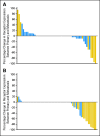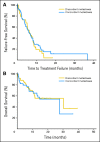Prospective study evaluating the impact of tissue confirmation of metastatic disease in patients with breast cancer
- PMID: 22124102
- PMCID: PMC5015424
- DOI: 10.1200/JCO.2010.33.5232
Prospective study evaluating the impact of tissue confirmation of metastatic disease in patients with breast cancer
Erratum in
-
ERRATUM.J Clin Oncol. 2016 Apr 1;34(10):1156. doi: 10.1200/JCO.2016.67.1685. J Clin Oncol. 2016. PMID: 27009020 Free PMC article. No abstract available.
Abstract
Purpose: Decisions about treatment for women with metastatic breast cancer are usually based on the estrogen (ER), progesterone (PgR), and human epidermal growth factor receptor 2 (HER2) status of the primary tumor. Retrospective data suggest that discordance between primary and metastatic lesions leads to detrimental outcome. This prospective study investigated receptor status of primary tumors and metastases in the same patient and assessed the impact of discordance on patient management and survival.
Patients and methods: Biopsies of suspected metastases were analyzed for ER, PgR, and HER2. Primary tumors and metastases were analyzed using similar methodology. The treating oncologist indicated a treatment plan before and after biopsy to determine whether the result influenced management. Patients were followed up for progression or death.
Results: Of 121 women undergoing biopsy, 80% could be analyzed for receptor status. Discordance in ER, PgR, and HER2 between the primary and the metastasis was 16%, 40%, and 10%, respectively. Biopsy led to a reported change of management in 14% of women (95% CI, 8.4% to 21.5%). Fine-needle aspiration and biopsy of bone led to reduced ability to analyze receptors. After a median follow-up of 12 months, there were no trends for an association between receptor discordance and either time to treatment failure or overall survival.
Conclusion: Biopsy of metastases is technically feasible. Clinicians alter immediate management in one of seven patients on the basis of results of the biopsy, and discordance is not then associated with detrimental effects on outcome. Tissue confirmation should be considered in women with breast cancer and suspected metastatic recurrence.
Conflict of interest statement
Authors' disclosures of potential conflicts of interest and author contributions are found at the end of this article.
Figures




Comment in
-
Testing for discordance at metastatic relapse: does it matter?J Clin Oncol. 2012 Feb 20;30(6):575-6. doi: 10.1200/JCO.2011.36.6385. Epub 2012 Jan 30. J Clin Oncol. 2012. PMID: 22291087 No abstract available.
Comment on
-
Loss of human epidermal growth factor receptor 2 (HER2) expression in metastatic sites of HER2-overexpressing primary breast tumors.J Clin Oncol. 2012 Feb 20;30(6):593-9. doi: 10.1200/JCO.2010.33.8889. Epub 2011 Nov 28. J Clin Oncol. 2012. PMID: 22124109 Free PMC article.
References
-
- Brennan MJ, Donegan WL, Appleby DE. The variability of estrogen receptors in metastatic breast cancer. Am J Surg. 1979;137:260–262. - PubMed
-
- Holdaway IM, Bowditch JV. Variation in receptor status between primary and metastatic breast cancer. Cancer. 1983;52:479–485. - PubMed
-
- National Comprehensive Cancer Network. Practice Guidelines in Oncology: Breast Cancer v. 1.2010. http://www.nccn.org/professionals/physician_gls/f_guidelines.asp#site.
-
- Li BD, Byskosh A, Molteni A, et al. Estrogen and progesterone receptor concordance between primary and recurrent breast cancer. J Surg Oncol. 1994;57:71–77. - PubMed
Publication types
MeSH terms
Substances
LinkOut - more resources
Full Text Sources
Medical
Research Materials
Miscellaneous

